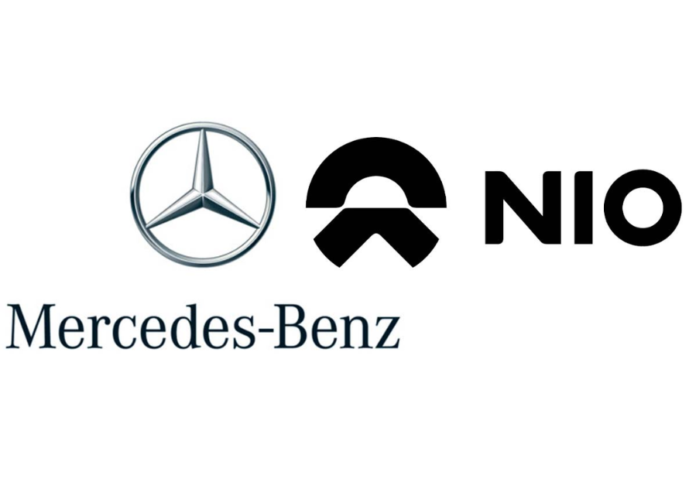The Nio-Mercedes talks correspond to a trend of increased collaboration between experienced automakers and new players as Chinese EV businesses strive to survive a consolidating local industry by selling advances to established automakers.
Nio has undertaken preliminary exchanges with Mercedes-Benz about a partnership in which the German automaker would invest in the Chinese electric vehicle company in exchange for technology, according to sources with direct knowledge about the issue.
According to the sources, Nio’s founder and CEO William Li explored the potential tie-up with Mercedes CEO Ola Kaellenius previously this year, proposing an investment from the latter in exchange for the loss-making Nio sharing its research and development expertise with Mercedes.
According to them, the talks did not progress beyond discussing the specifics of the technology to be transferred and the prospective financial commitment.
One of the sources added that Nio reached Mercedes with the tie-up plan, but it was met with resistance within the German firm that discussed it internally in recent weeks, and that it was far too unlikely to proceed. When approached, Nio denied discussing a partnership with Mercedes, calling it “untrue” and refusing to elaborate.
In a separate comment, Mercedes stated that, while there are no plans for partnership with Nio, “Ola Kaellenius is in an ongoing regular dialogue with various industry leaders and peers, including William Li.”
The sources declined to be identified because the topic is confidential.
The Nio-Mercedes talks correspond to a trend of increased collaboration between experienced automakers and new players as Chinese EV businesses strive to survive a consolidating local industry by selling advances to established automakers.
By forming such alliances, Chinese EV companies may be able to overcome potential trade barriers more readily.
Many competitors are attempting to reinvent themselves in order to catch up with Tesla and Chinese enterprises as EV adoption accelerates in markets around the world.
Volkswagen was a pioneer, announcing partnerships in July to jointly develop new models for China, the world’s largest auto market, based on Xpeng’s EV platforms while utilising SAIC Motor Corp.’s technologies for Audi.
According to media and other sources, China’s Leapmotor has reached out to global companies, including India’s steel-to-energy JSW Group, VW’s Jetta brand, and Stellantis, for licencing its EV platforms, batteries, and motor technologies. Leapmotor has refused to comment on the situation.
By pursuing tie-ups and funding from major automakers, China’s EV startups are following Tesla’s route, while the EV market leader is struggling to scale up production. Elon Musk has stated that a $50 million investment from the Mercedes-Benz group saved Tesla in 2009.
Nio, whose investors include Chinese tech behemoth Tencent Holdings, has publicly advocated for similar collaborations with established automakers. It presently lacks any.
“They [legacy brands] have been too successful to be agile in smart EV development.” “This is a challenge for any CEO who runs a company with hundreds of thousands of employees,” Nio’s Li informed reporters in September at an event displaying its self-developed technology ranging from batteries and semiconductors to autonomous driving and smart manufacturing.
He stated that it is better to seek win-win partnerships with EV startups rather than wasting so much money and time yourself.
The resistance at Mercedes, however, is an indication of the constant challenge of the EV shift adjustment.
The source claimed that due to worries that such a tech alliance could damage Mercedes’ reputation as a premium brand, the R&D and strategy divisions at Mercedes were overwhelmingly opposed to the proposals. Another concern was that it might disturb shareholder unity given that Mercedes’ two largest single shareholders were Chinese auto sector firms.
Despite its inconsistent sales performance in China, Mercedes plans to increase its market spending to grow its R&D team and speed up advances in electrification and digitalization.
Nio, ranked No. 9 among Chinese producers of electric and hybrid vehicles, has therefore expanded investment in locally produced technologies for parts like chips and batteries.
But other investors are worried that the automaker, which has seen its losses expand amid a strong price battle in China, is taking on too much as a result of its expansion into markets like smart phones.
In the three months that ended in June, Nio’s net loss more than doubled to 6.12 billion yuan ($839.51 million). As of June 30, it had cash and equivalents worth 31.5 billion yuan, down from 42.3 billion at the end of 2022.
7.3127 Chinese yuan (renminbi) are equal to $1.
Do Follow: CIO News LinkedIn Account | CIO News Facebook | CIO News Youtube | CIO News Twitter
About us:
CIO News, a proprietary of Mercadeo, produces award-winning content and resources for IT leaders across any industry through print articles and recorded video interviews on topics in the technology sector such as Digital Transformation, Artificial Intelligence (AI), Machine Learning (ML), Cloud, Robotics, Cyber-security, Data, Analytics, SOC, SASE, among other technology topics.






